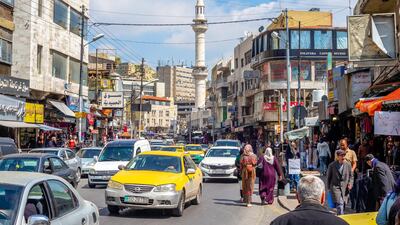Three cases of the more contagious Indian variant of Covid-19 have so far been found in Jordan despite those infected not travelling abroad, authorities said just days after relaxing pandemic control rules.
"Two cases were recorded in Amman and one in Zarqa in people who did not travel, which confirms that the emergence of mutated cases does not necessarily have to come from outside, but rather as a result of specific reproduction," Health Minister Firas Al Hawari told broadcaster Al Mamlaka TV on Saturday.
“We always said that these mutations are expected and that they would not necessarily come from the outside,” he said.
Mr Al Hawari did not specifically if it was the B.1.617 variant that has been located in India that was identified in Jordan.
Instead, he said the infection surge in Jordan this year had caused the same mutations as the Indian variant to occur on their own.
The B.1.617 variant contains two key mutations to the outer "spike" portion of the virus that attaches to human cells.
He said cases of Brazilian and South African strains were also detected in Jordan without infected people having come from abroad to spread the new strains.
The minister said that seven people who arrived in Amman’s airport from India through the Gulf at the weekend have been placed in a two-week quarantine, although they tested negative for the virus.
But Mr Al Hawari said he was “optimistic” that vaccines available in the country would help contain the new mutation.
“We are optimistic about the vaccines. We call on people to take them, and quickly,” he said.
The UK’s Public Health England said there was no indication the Indian variant could evade current vaccines and White House chief medical adviser Anthony Fauci said early studies showed Covaxin, a vaccine developed in India, appears capable of neutralising the variant.
Although vaccinations in Jordan started in January, officials say only 7 per cent of Jordan’s 10 million people have been given at least one dose of a coronavirus vaccine.
They say registration to take the vaccines remains low, despite vaccine availability and sharp rises in death from the coronavirus this year.
The minister did not say whether the government will be taking any specific measures to halt any spread of the Indian mutation.
The announcement of the more infectious variant that is thought to be contributing to the massive rise in cases and deaths in India in recent weeks could hinder the Jordanian government’s goal of easing most coronavirus rules by July.
The government is keen to revive tourism and restart economic activity.
The virus has compounded a recession in Jordan and the authorities last week relaxed an all-day curfew on Fridays, citing the easing of a surge of infections that began in February.
On Saturday, the first plane carrying East European tourists arrived in the Jordanian port city of Aqaba after one year.
The flight from Bulgaria was made possible after the government waived airport fees and gave the tour operator other exemptions.
The authorities also announced they would step up the vaccination campaign for those in the tourist sector in the Aqaba area.
The latest official data show 26 new coronavirus deaths recorded in Jordan on Sunday, bringing the total to 8,897 deaths.
Another 814 people tested positive for the coronavirus, raising the total recorded infections to near 713,000.
Doctors estimate that the actual number of infections in Jordan is much higher because of limited testing capacity.


